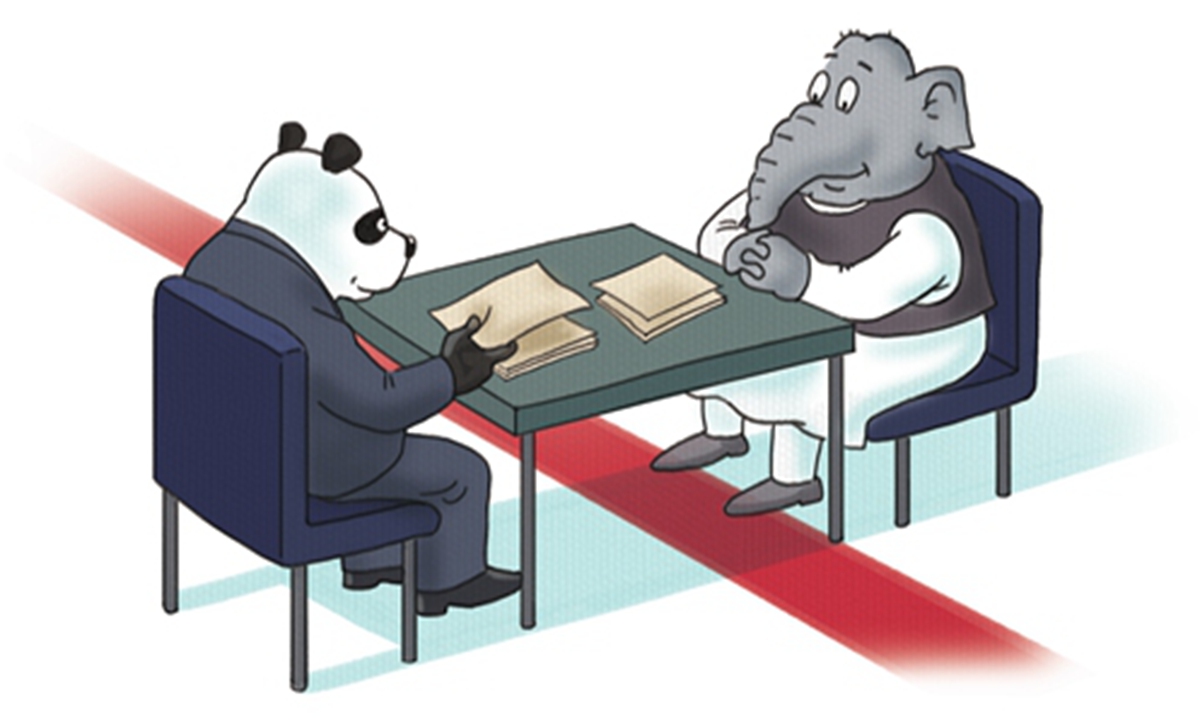New fighter jets fuel nationalism in India
By Xie Chao Source: Global Times Published: 2020/7/30 22:37:48

Illustration: GT
Five Rafale fighter jets bought from France landed in India Wednesday, the first part of an ordering totaling 36 planes.
Indian Defense Minister Rajnath Singh tweeted on the same day, "If it is anyone who should be worried about or critical about this new capability of the Indian Air Force, it should be those who want to threaten our territorial integrity." This was widely considered by Indian media outlets as a message toward China.
It sounds like the fighter jets were bought especially for a possible immediate fight with China. This is laughable. The order was made as early as 2016. Indian politicians are simply taking advantage of the arrival of the fighters to appease Indian people's nationalistic sentiment and criticisms from the opposition forces.
Reports show that disengagement between Chinese and Indian border troops have been completed at most locations. Yet the border standoff between them is not over yet. On Monday, the Hindustan Times reported that "the Indian Army for the first time has deployed a squadron (12) T-90 missile firing tanks, armored personnel carriers and a full troop brigade (4,000 men) at Daulat Beg Oldi," an Indian military base near the Aksai Chin region in southern Xinjiang. This is not a sign of sincerity of easing border tensions.
Disengagement in key locations still needs long-term consultations. Pro-US forces in India are now coordinating with US' attempt to stir up security troubles in China's surrounding regions. This escalation is timed with US' presidential election, which is just around the corner, and Trump's only tactic is ramping up animosity toward China to boost his support. Indian Prime Minister Narendra Modi's administration is taking the situation, diverting public's attention from the government's incompetence in resolving domestic issues.
What the Modi administration is trying to skirt around is unfortunately the biggest crisis India confronts - epidemic prevention and control, and economic development. Problems in these two areas are severely affecting India's grassroots population, who have been hurt the most by the virus and have benefitted little from the country's economic development. At this time, hyping up nationalism among these people could make them forget their own miseries, and continue their fanatical support for Modi's administration.
Singh implicitly hyped the so-called China's expansionism and "China threat" theory. However, it is the Indian army which has been promoting the tactic of nibbling the border areas by increasing patrols and building border outposts in disputed regions.
India should now know that trust-building measures in border areas are beneficial more to the weaker side - that is the Indian side. If New Delhi abandons related regulations, the Chinese military will have more choices to deal with illegal border-crossing moves of the Indian troops.
India can hardly afford another skirmish on its border. The Modi administration is only showing a tough attitude amid opposition parties' ceaseless and fierce attacks against it. On the other hand, China's consistent and predictable stance and behavior over its sovereignty is deterring India's opportunists. New Delhi might be willing to bang the war-drum for Washington, but it will never turn itself into cannon fodder for the China-US competition. An outbreak of a military conflict between China and India is thus unlikely to occur in the short term.
Historically speaking, New Delhi and Washington have been at logger-heads before. However, due to their similar ideologies, India's Western-styled education, and the influence of US non-governmental organizations in Indian society, today pro-US Indian elites are gaining stronger foothold in their country.
For India, the ongoing China-US tension is a chance to join the major powers club. India believes the rivalry with the US can hinder China's development, and that support from the US might elevate India's global status.
New Delhi needs to wake up to the fact that the gap of national strength between China and India is actually widening. It should also realize that the US will hardly provide India with any solid benefits. How India reacts to these realities will determine its future diplomacy with China.
But such recognition will not likely emerge in India any time soon. And the country will keep trying to profit from the worsening China-US conflict.
The author is assistant professor at the Institute for International and Area Studies, Tsinghua University. opinion@globaltimes.com.cn
RELATED ARTICLES:
Posted in: ASIAN REVIEW